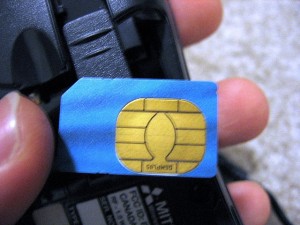 via mroach
via mroach
Though we’ve known for a while that our phones could be hacked through one method or another, one thing we never suspected was that our SIM cards themselves could be turned against us. Recent research has found that your phone, among half a billion other devices around the world, could be susceptible to hackers – unless your carrier acts fast.
For three years, German cryptographer Karsten Nohl has discovered encryption and security flaws that could allow hackers to access your personal information and use your phone to commit fraud, according to Forbes. Nohl and his research team at Security Research Labs tested almost 1,000 SIM cards and found that just under 25% were able to hacked. Susceptible phones use Data Encryption Standards (DES), a system that was developed in the 1970s. Because encryption standards vary around the world, Nohl estimates that one-eighth of the world’s SIM cards could be vulnerable to the hack.
“Give me any phone number and there is some chance I will, a few minutes later, be able to remotely control this SIM card and even make a copy of it,” Nohl said.
 Thankfully, Nohl’s team uncovered the security flaw proactively, as it doesn’t seem hackers are yet aware of the way in. This gives wireless carriers time to fix the issue before any harm can be done. Two large carriers have already begun searching for a patch for the vulnerability of their SIMs. Additionally, both Verizon and AT&T report that their SIMs are not vulnerable to the flaw, AT&T claiming that their cards have used triple Data Encryption Standards (3DES), a more advanced set of encryption standards not believed to be susceptible to the hack, for almost 10 years.
Thankfully, Nohl’s team uncovered the security flaw proactively, as it doesn’t seem hackers are yet aware of the way in. This gives wireless carriers time to fix the issue before any harm can be done. Two large carriers have already begun searching for a patch for the vulnerability of their SIMs. Additionally, both Verizon and AT&T report that their SIMs are not vulnerable to the flaw, AT&T claiming that their cards have used triple Data Encryption Standards (3DES), a more advanced set of encryption standards not believed to be susceptible to the hack, for almost 10 years.
Another bug found by Nohl’s team, though, may prove to be a deeper and more widespread problem for SIM card owners. Unrelated to the initial hack involving the weak encryption key, this bug allows viruses to spread from an infected SIM card to programs pre-installed on SIMs such as the Visa and PayPal apps. This hack exploits a flaw in the “sandboxing” concept controlling Java Cards, in which separate programs are protected from the rest of the information on a SIM. Viruses sent to vulnerable SIMs can not only break through this sandboxing mechanism but also check the files of payment apps installed on the cards. Nohl found that “this sandboxing mechanism is broken in the most widely-used SIM cards,” like those from vendors Gemalto and Oberthur. The SIMs provided by any carrier that partners with these vendors could be affected, regardless of how robust their encryption standards may be. This means carriers like AT&T and Verizon are at risk, too. The potential for malicious hacking of payment apps could prove a serious danger as mobile payments increasingly become a norm in today’s hyper-connected world.
Nohl will provide further information on his discoveries on July 31 at the Black Hat Technical Security Conference in Las Vegas.
Image via Roman Soto
What do you think about the discovery of these SIM flaws? Do you think SIM card manufacturers and phone carriers will move fast enough to deter hackers from causing damage?



Thanks for the ‘heads up ‘.